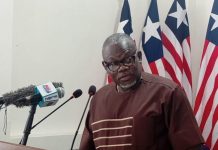
Africa-Press – Liberia. Janet Chengbe, 47, sat behind her table in the Rally Town Market in Central Monrovia on a sunny afternoon, winking her eyes from left to right in search of customers, caring less for a Biometric Voter Registration for the conduct of the 2023 general and presidential elections in Liberia due to lack of clear understanding on the entire process.
The Biometric Voter Registration was proposed by the National Elections Commission (NEC) and accepted for the country’s next elections scheduled for October 10.
Janet, a mother of four children, has been selling frozen foods in the market for the past 15 years. Though she has voted in several elections using a manual system, she has never heard about a Biometric Voter Registration.
She’s among thousands of Liberians who do not clearly understand the nomenclature “biometric.”
Speaking in an interview with FrontPage Africa at her selling place on Monday, Janet expressed unwillingness to participate in the pending elections due to lack of awareness on the biometric voter registration and the failure of elected officials to live up to promises made to the Liberian people during electioneering periods.
“I have never heard about biometric or the new voting card before. We have not seen elections people here to tell us”, she stated.
Janet is instead focusing on her daily bread and how her business is struggling these days. “People are not buying like before and I will not vote next year. The reason people can vote is for real changes to come in the country for everybody to enjoy. But right now, I am not thinking about voting because, I am not enjoying anything. When I come sell, one carton of frozen chicken, the goods can make three to four days with me. So, for what reason I should continue to vote for other people to enjoy and me and my family be suffering?”
Obtaining card for different purposes
Unaware how the biometrics bidding process will play out, Janet vows that she would instead obtain either the old or new voter registration card to use it for different purposes, instead of using it to vote in the next elections.
In Liberia, voter registration cards are used for multiple national services including travelling, banking and other activities. “Maybe I will get that registration card and keep it. I don’t have problem with it. But I can’t stand on the sun to go vote,” Janet laments.
Same old card
Janet stresses the need for the Government of Liberia (GOL), through the National Elections Commission (NEC) to abandon the biometric registration of voters for the elections.
The marketer says acquiring biometric voter registration cards would be challenging for marketers, especially those who are illiterate.
“The same old way we used to get our voter registration cards first, that how they should do it because, we are businesspeople and we do not like plenty hard time. We like to come behind our markets to sit down and sell. We like the one they will take your picture, put your name down and give your card and you come and sit down behind your table. We the market people don’t like something that can give people problem.”
Janet argues that marketers should be allowed to stick with what they already know because the time is just too short to change. “We should use the same old registration card and they should forget about that new one they want bring. I can’t even tell whether when they bring that new one some of us will go register or not.”
People will not register
Across the country, citizens are expressing fear that there would be poor turnout for voters’ registration if thorough awareness is not provided on the biometric exercise.
Many are also concerned that the inaccessibility to the leeward areas also poses a threat to the equipment that would be used by NEC workers and prevent citizens in the hard-to-reach areas the opportunity to register and vote.
“These things are equipment and the possibility of them getting damaged cannot be overemphasized. NEC will be caught in a situation where an entire community or district cannot register in time because of the malfunctioning of the biometric equipment,” Prince Williams, a university student stated.
Doris Tarley, 63, and a mother of three children is a resident of the Soniwein Community in Monrovia.
Like Janet, Doris has never set eyes or lay hands on a biometric voter registration card.
“I have not heard about it or seen NEC people here. I don’t know about that one and so, I want my same old card and same old way of voting. They must bring our old registration card because some of us do not know book for people to educate us. People will not register to vote if they bring the new way. When the people educate us, people who like it, they will vote. But as for me, I want the old way of voter registration. They should educate us on how to get the card and vote.”
Rachel M. Addy, 50, a mother of four children, has been selling fufu for eight years in the Rally Town Market.
Fufu is a typical Liberian food made from dried cassava.
She expresses the hope that regardless of whatever process, citizens will turn out to obtain their voter registration cards to vote. “I am forced to vote though we have not seen the elections people here telling us about this new thing they brought. But I want to vote the same old way. Anything they do, we will vote.”
Not timely due to lack of electricity
H. Boima Konneh, 31, is one of the leaders at the Nelson Mandela Intellectual Forum in the Red Hill Field Community, outside Monrovia observes that the lack of stable and affordable electricity may hinder the process, especially in the leeward areas.
For now, Konneh laments, “biometric voter registration is not timely because of the country we find ourselves in first when it comes to electricity issue. It may not be able to cover even in the city, not talking about the rural area. We should wait and maybe try it in 2029. Realities are established from rumors. People perceive some malpractices in the procurement process. And if it holds or remains like the way it is, it will bring out problems that people were not expecting.”
International Community should take charge
Konneh stresses the need for Liberia’s international partners to take charge of the entire process.
“I recommend that the International Community supersedes everything. The 2023 elections are not like the elections we had in 2017; this is a different kind of elections, and we need people who will guide and put all mechanisms into place to make sure that our country is stable, and the elections are free and fair.”
Konneh explains that already, threatening remarks are being made by some stakeholders, and as such, Liberia’s international partners should intervene and take cease of the matter. He, however, felt short to disclose the names of those stakeholders who are making threatening remarks in the country.
Konneh maintains that the post-conflict nation will be unstable if the pending processes leading to the 2023 elections are misguided. “If the biometric voter registration process is not well guided, Liberia will be a different country from the one we are in now and we are not prepared for it. We don’t want to go back to the dark days. We want peace and we want our country to be stable to move forward”.
A replica of 2020 referendum
Junior Kiadii, 33, has voted in past elections with no knowledge of a biometric voter registration.
He foresees the 2023 general and presidential elections suffering a serious setback like the 2020 national referendum if biometric voter registration is accepted.
“I have been hearing people discussing about the biometric voter registration on air. If it was timely, we will say it’s necessary for 2023. There’s a saying that ‘anything that is not done properly, is not done at all. The biometric registration for now is not timely. For that, reason, it is not necessary. The 2020 referendum had many propositions that were cardinal, but the time in which the NEC brought the referendum was not timely. They didn’t do proper awareness, and this is the same with the biometric.”
KIadii says the lack of stable electricity and internet connectivity may serve as hindrances to the process. “There will be serious confusion if we go about with the biometric because, some people will register and participate in the elections, and it will reach to some areas where voting will not take place.”
Konneh is urging Liberia’s international partners to either discourage or take charge of the biometric voter registration for Liberia and its citizens to “proceed on our normal way of voter registration.”
He is also urging authorities of the NEC to put aside their “self-interest and do the right thing” in all bidding processes leading to the elections.
Call for fair elections
Pauline Sonpon, 40, and mother of two children wants any system of voter registration for the conduct of the 2023 elections to peacefully usher in a new government that will elevate the living standards of the citizens. “I want money to be in town and people will buy from us. We that are selling, people will buy from us. Maybe, I will leave the bread I am selling to sell different thing after the elections and things prices will come down.”
Sonpon says she has not heard about the new registration card yet. “I live West Point and we have not seen election commission people yet.”
The businesswoman further stressed the need for NEC to ensure that the elections are free and fair in the wake of its proposed biometric registration exercise. “We want the old way of registering because; we don’t know the new one. They should show us how to do it.”
Moving to modernization
James Yancy, 54, observed that the proposed biometric voter registration is intended to modernize Liberia’s electoral system.
He wants a perfect test of the biometric registration come 2023 for Liberia to be on par with other countries across the African continent.
He noted that the NEC should allot ample time for awareness as part of efforts to sensitize the electorates, many of whom are novices to the entire process. “For me, the biometric is not bad because we are in modern days. You don’t expect things to always be the same. Things will advance at certain time. The only thing I want is for the biometric to be done perfectly. NEC should put in time and allot at least 30 days for awareness.”
Despite Yancy’s support for modernizing the process, he predicts poor voter registration exercise if the NEC fails to sensitize the electorates prior to the commencement of the biometric voter registration. “If the awareness is not properly carried out, how do you expect people to go register and vote especially for people who are illiterate? So, let the awareness go on properly and let them know the important of the awareness before the elections can come about.”
The NEC has set from December 15, 2022, to March 24, 2023, for the biometric voter registration exercise.
Questionable Selection
However, the concerns being raised by the locals come in the wake of barrage of criticisms and rejection of the company the NEC selected for the biometric voter registration contract.
Recently, a report released by the Senate Committee on Autonomous Commissions and Agencies unearthed that the Chairperson of the National Elections Commission (NEC) Counselor Davidetta Brown Lansanah singlehandedly awarded a contract to Ekemp International Limited for the printing of biometric Voter Registration cards and other materials for the conduct of the 2023 general and presidential elections in Liberia, posing a threat to the nation and its people.
The report also questioned the credibility of the NEC Chairperson to conduct the pending elections.
The committee is headed by Bong County Senator Henrique Tokpa.
It was mandated to probe into circumstances surrounding biometric voter registration for the country’s pending elections and the awarding of the contract under a questionable bidding process.
In its findings submitted to plenary last week, the committee revealed that out of the six companies that participated in the bidding process, the Joint Venture of Ekemp International Limited, INITS Limited, and Palm Insurance Inc., and the Joint Venture of Professional Services Inc. and HID Global were considered by NEC to be “most responsive to the pre-financing requirement which was a major requirement for evaluation.”
It noted that the PPCC, which is the statutory body for ensuring that all procurement processes are done in a fair and transparent manner questioned the pre-financing capacity and the legitimacy of Ekemp/Palm.
It maintained that despite the PPCC’s objection of Ekemp and the “most responsive bidder”, the NEC awarded the contract for the biometric Voter Registration to the Joint Venture of Ekemp International Limited, INITS Limited, and Palm Insurance Inc., with equity and liabilities of the financing partner (Palm Insurance) in the Joint Venture is little over US$2.8M.
The total cost of the project is US$12M.
The committee furthered disclosed that Ekemp International’s Annual revenue position as of December 2021 was US$95,527,850.71 Hong Kong Dollars (HKD), which is equivalent to US$12,169,388.36 as stated in the communication from NEC to the PPCC, dated September 13, 2022.
According to the report, the next company that was considered by the NEC as responsive to the pre-financing requirement is HID Global.
HID Global has US$6.1B as a revenue position for the year 2021.
The report revealed that the company is an American company that mentioned Ekemp International as its technical partner in its Joint Venture agreement submitted to NEC previously.
The report questioned the rationale behind the decision taken by the commission to re-select Ekemp International for the biometric Voter Registration exercise despite the company’s flop during its re-demonstration performed at the re-evaluation bidding process conducted.
“NEC ignored the poor performance of Ekemp International at the re-demonstration of its bid proposal before the bid panel. Besides the poor performance of Ekemp International at the re-demonstration of its bid proposal, the media has a deep concern about why the NEC is bent or fascinated on selecting Ekemp International over bidders who are in better financial positions than Ekemp International since the pre-financing was the major requirement for selection of bidder.”
Recommendations
In its recommendations, the committee noticed the absence of the remaining commissioners of the NEC during its public hearings conducted on the matter.
The committee observed that any delay of the pending 2023 general and presidential elections will undermine Liberia’s fragile democracy.
The report has been submitted and debated by the Senate. However, no final decision has been reached on the matter.
Citizens’ reluctant
Already citizens are feeling reluctant to vote or exercise their political franchised due to the failure of the government and other elected officials to failure campaign promises made to them
The high rate of illiteracy in Liberia occasioned with the lack of awareness on the biometric registration would serve as a recipe for confusion and chaos if the process goes ahead as it is.
Despite the situation, Liberians want the next government to concentrate on improving their living conditions by providing job and investment opportunities as part of efforts to boom the economy, instead of focusing on issues that will benefit a selective few in the nation.
They want better road connectivity and the unhindered availability of the nation’s staple food, rice on the local market.
The proposed biometric voter registration may be a blessing or a curse on the post-conflict nation depending on the manner and form in which it is handled by the government and its international partners.
‘This is Confusing Me’: What Liberians Are Saying About Biometric Voting
Matthew Yeabah, resident, Monrovia: To be very frank, I do not understand the meaning of biometric process. This is because awareness has not been created for us to understand the meaning of biometric. But what I really know is the process to get our passport, they tell us that we go through a biometric process. And this is confusing to me because each time you renew your passport, you will follow the same process before you can get your passport.
Emmanuel Gomoyan, Moderator, Center for the Exchange of Intellectual Opinions: My take on this biometric voter registration is that Liberia is struggling with the digital system: no stable electricity, internet and network connection throughout the country. And looking at the time frame, where there is no set date for voter registration, we must look at it very critically.
James Holmes, Lecturer, University of Liberia: This is a good idea. We all want to see good things in Liberia, but as for me, I have serious problems with the biometric system. And that is, you are introducing a new phenomenon in Liberia. And to make this thing accepted and workable, you need to carry out some sensitization. I believe that NEC is on the right footing, but the issue is we need more sensitization if we don’t want to have the same problem as what we are having with LISGIS. We need robust awareness. This has been working in Ghana, Nigeria and other African countries, but Liberia is just introducing this system.
Spencer Sieh: The biometric process is very important because it is an international standard. In terms of awareness, our people need to do more. Our common people in the rural areas, most of them are not aware. Even the educated ones need to be aware. So, NEC needs to do more awareness. We are going to very crucial elections, and it is important for us to do everything to minimize flaws and get rid of fraud.
Othello Garlay, student and resident, Monrovia: The Biometric system is really a good system. This is accepted globally. It will stop people from registering more than one time. In this modern time, we should change the dynamics to ensure our electoral system is transparent. But to make it successful, the National Elections Commission should carry the message across- throughout the length and breadth of this country to educate the people because most of them are illiterate.
Alvin Vankpanah, Moderator, Center for the Exchange of Intellectual Opinions:
The issue of the biometric system is the first of its kind and is welcoming. Remember, we are in the digital age. And I believe the National Elections Commission knows that biometric is helpful in promoting transparency that is why it is introducing it. But in terms of the publicity, the National elections Commissions has not done adequate publicity to inform the citizens about the importance of the biometric system. I understand there is a misunderstanding between the NEC and the PPCC over the awarding of the biometric contract. If it is now settled, then I want to call on the NEC to start awareness now.
For More News And Analysis About Liberia Follow Africa-Press





